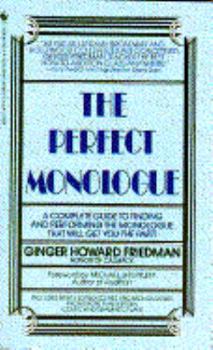The Perfect Monologue
A veteran casting director, playwright, and teacher shows aspiring actors how to choose and creatively edit a monologue, find the character within themselves, and rehearse, present, and perform the... This description may be from another edition of this product.
Format:Mass Market Paperback
Language:English
ISBN:055328391X
ISBN13:9780553283914
Release Date:August 1990
Publisher:Bantam
Length:374 Pages
Weight:0.45 lbs.
Dimensions:1.0" x 4.2" x 6.9"
Customer Reviews
3 ratings
A book for young actors
Published by Thriftbooks.com User , 17 years ago
This book attempts to teach actors how to properely do a monologue when they audition for a role. Friedman has long experience in the field as actor herself and also as a person involved in the casting of roles. She explains in her introduction why most monologues are performed amateurishly by prospective actors. She tries to give a sense of how the actor when auditioning for a role should be engaged in dialogue with another. She warns against certain kinds of extreme, dramatic , attention- getting practices which turn off those assessing the audition. She makes it seem as if the whole process of giving a monologue and especially listening and assessing them is a tormenting and unsatisfactory process. And she provides her suggestions on how to do the monologue in a way which will highlight the talent of the actor in question. She then provides a number of texts( which are in fact the bulk of the volume) which she has constructed as monologues for auditions. I am not an actor, and do not have real knowledge of the whole process of auditioning. I simply had curiosity about it , and this is why I read the introductory and explanatory parts of this book. My sense is it can probably be of help to auditioners. But I am not at at all certain that this will be in a 'perfect' way.
Great resource for original monologues
Published by Thriftbooks.com User , 17 years ago
One of the things that handicaps actors in auditions is that the best contemporary monologues are so often used by actors that directors are tired of them and are not able to get a fresh look at new talent. Friedman fixes this problem by showing actors how to take scenes between two or more characteres and condense them into monologues. Friedman condenses numerous scenes into monologues, which is itself a service to actors, but it is her comments that attend each monologue that I find most interesting. Why? Because Friedman does something that is not always taught by acting teachers: in example after example, she shows you how to find what drives the character. Such drives are not the same as goals: they are central, even universal drives that are shared by all people, but that are, in the specific monologue (or scene) at hand, literally what drives the character to do what he or she does at that moment. This skill -- identifying universal drives -- is so important to acting (and to writing, as well), that Friedman's repeated drumming of it into the actor/reader's head makes her book a true gift. You can spend all day speculating about what really drives people and get no further than theory. Friedman, however, nails it every time, in her own inimitable way. I've heard that Friedman is not a very nice person. I don't care. I once heard Sande Shurin -- also a great, great teacher -- tell a student: "I'm not a nice person. If you're going to be tough on yourself, don't take my class -- study with one of the other teachers at my studio." Niceness is not what characterization is about. Characterization is about seeing the truth inside another human being. I use Friedman's work in my "Archetypes for Writers: Using the Power of Your Subconscious" course and book. Both actors and writers can benefit from her courage and insight.
A classic on *creating* your own monologue...
Published by Thriftbooks.com User , 23 years ago
I think what other reviewers missed about this book is that its intention is to teach the reader to *create* their own monologue from the dialogue of a scene. Most monologues are boring diatribes on some story (I remember the time I...) and they don't work well in an audition. Ginger worked with Michael Shurtleff (author of "Audition") for several years as a casting director...she knows her stuff. This book shows you how to create an *active* monologue using dialogue between two characters. The examples from "old plays" are classics that are still performed regularly. They are not intended for use...they are examples of how to pull dialogue from a play to use as an audition. An excellent book, and highly recommended from a working professional actor. See also "Callback" by Ginger Friedman.






